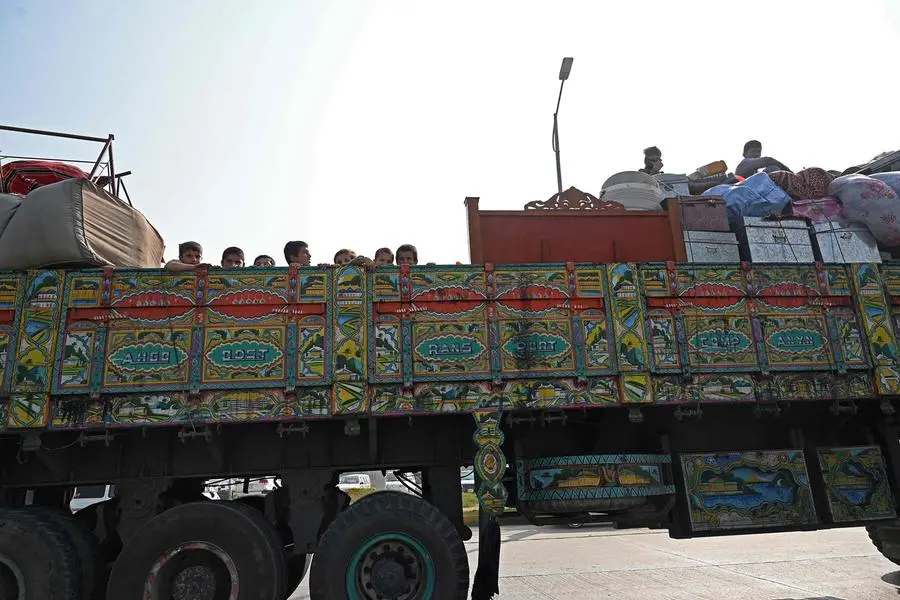PHOTO
Benafsha and her six children huddle together on a ragged blanket between trucks piled high with their household belongings on the Afghan border, after fleeing potential deportation from Pakistan.
Her family, like thousands of others, slept outside near the Torkham border crossing and face the prospect of multiple nights in the cold, open air with limited access to food and water, waiting to register with Afghan authorities.
"Afghans have been kicked out of Pakistan and they've come here in winter, it's cold and there are a lot of problems here," the 35-year-old, four months pregnant with her seventh child, told AFP on Monday.
Pakistan border officials say more than 100,000 people have crossed into Afghanistan since the beginning of October, when Islamabad announced a November 1 deadline for the 1.7 million Afghans it says were living illegally in Pakistan to leave.
Numbers have surged at the Torkham crossing since Friday, Taliban officials and the International Organization for Migration (IOM) said, leaving authorities and aid groups scrambling to process waves of returnees, many of whom have nowhere to go.
- 'Emergency situation' -
The brightly painted truck Benafsha rented with two other families for 50,000 Pakistani rupees ($180) each -- a steep sum for most Afghans in their situation -- and packed to the brim with furniture, appliances and belongings will carry them part of the way to their province of origin, Kunduz.
"In Kunduz we don't have land, or a home, or work," said the woman, who was never documented in Pakistan despite living almost all her life in the country.
"We don't have anything there."
Taliban authorities have condemned Pakistan's actions, saying Afghans are being punished for tensions between Islamabad and Kabul and calling for people to be given more time to leave.
Samiullah Samoon heads up immigration registration at Torkham and said the crossing is facing "an emergency situation".
"Neither the Islamic Emirate nor NGOs... had preparations in place on such a scale. This situation was sudden," he said, citing issues of water and shelter.
The government has established commissions to address the issue, and announced a temporary camp would be set up several kilometres (miles) from the border for about 1,200 families.
Staff and technical reinforcements have also been sent to Torkham.
"The number of returnees is high, we have only forty people registering them and it takes time, that's why they are kept waiting here."
- 'Don't know what to do' -
By early morning on Monday, a long line snaked out of the registration area and down a road heaving with people, with some providing aid to the migrants and others manning businesses that have sprung up around the ad hoc camp.
About 1,000 families were processed on Monday, Samoon said, leaving another 400 still waiting, with thousands more people waiting on the Pakistani side of the border as they race to meet the November 1 deadline.
UN agencies, headed up by the IOM, have set up services for those arriving, but have strained under the surge in demand.
"During the past two weeks we had 2,500 to 3,000 individuals a day but starting from Friday the numbers doubled on a daily basis," said IOM regional coordinator Ziad Salih.
"Our transit centre is designed to serve up to 750 per day and now we are dealing with 7,000. It's tiring but we are pushing, we don't stop."
Samoon said around 60 percent of the families who have returned do not have strong ties in Afghanistan.
A crackdown by Pakistan, however, has spurred people to return anyway, including some who had a legal right to stay.
Taza Gul lived in Pakistan for 40 years but felt compelled to leave after his sons were arrested.
"They detained my sons, I got some released and some are still in jail. I had no more money to get them out," said the 55-year-old.
He had entered Afghanistan at the Spin Boldak crossing in southern Kandahar province, where thousands of Afghans also wait for registration with the government.
Gul's family, like many others, rushed to pack what they could, but left work, homes, cars and even family members behind.
Mother-of-six Golnaz started to cry as she told AFP that she had left Pakistan with neighbours after her husband was arrested.
"My husband is in prison in Pakistan," she said, clutching her youngest child and a worn-out identification document as she went to join the crowd waiting for registration.
"I don't know what to do."





















